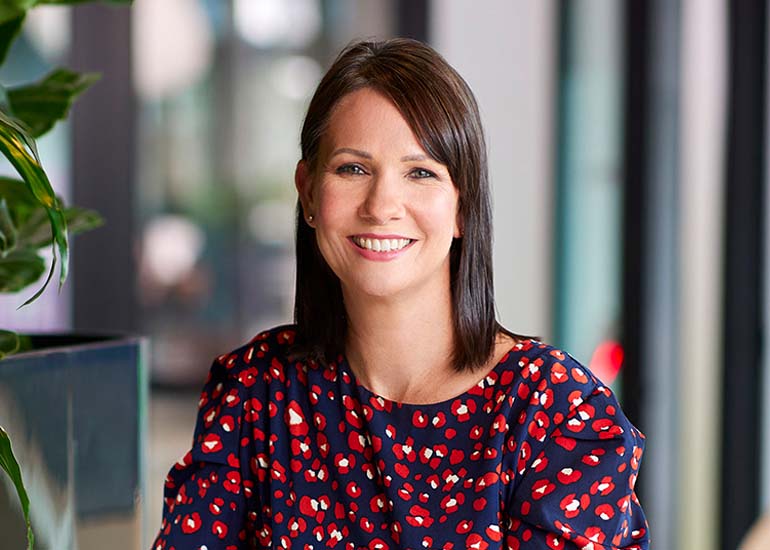Today's female tech leaders are still in the minority - making up just 31% of Australia's workforce. I had the privilege to interview MYOB's CFO, Caroline Rawlinson, on her experience as a woman in tech. Below is a copy of the article published in Women Love Tech to mark Ada Lovelace Day. Read on to learn about opportunities for positive social change and the importance of accelerating female leadership representation.
Almost two centuries ago, British mathematician Ada Lovelace designed the world’s first programmable computing machine. While so much has changed since then, today’s female tech leaders are still in the minority – making up just 31% of Australia’s technology workforce. Gender equality in the C-suite generally is also lagging on our shores, with women in just 28% of all senior roles. As the Chief Financial Officer (CFO) of Thoughtworks Australia, I know how important it is to accelerate female leadership representation. I recently sat down with MYOB’s CFO, Caroline Rawlinson, to reflect on her experience, and where she sees opportunities for positive change.


Ada Lovelace portrait by Margaret Sarah Carpenter
Embracing a female style of leadership
Having worked in male-dominated sectors – from fishing and construction to manufacturing and now tech – Caroline says she has enjoyed every one of those environments.
“I enjoyed the cut and thrust of it. I was fairly outspoken and confident given how young I was in my career,” she tells me. “Providing a female perspective was beneficial, at a time when gender diversity was just starting to get some focus.”
However, Caroline acknowledges this wasn’t the experience for all women at the time, and many found it hard to be heard.
“I think societal shifts have occurred such that you can show up more authentically now as a female. We’re getting better at embracing the true sense of diversity.
“Now I’m working in technology, I have found MYOB’s culture much more diverse, inclusive and welcoming. There’s a much larger variety of backgrounds, and everyone is invited to provide input,” she says.
Caroline notes she experienced a lot of visible female leadership when working in Asia, and in particular China, as CFO for Formica Asia. “I found there was more gender equality, in the visible leadership sense, than I had experienced before.”
Pressed on why this might be so, she observes, “I think it could have been societal. There was very much a normalisation of women working and being equally valued in both public and private enterprise.”
Building a culture of diversity
Today, Caroline works in MYOB’s gender-balanced executive team and enjoys the organization’s “amazing cultural diversity”. She emphasizes “there is a lot of diversity of thought.”
“There are rational ‘black and white’ thinkers as well as creative thinkers. There are strategists and operational experts, as well as those experienced in core governance matters. There’s a great mix.”
Caroline says it’s important to be aware of our own cognitive biases when hiring.
“Like everyone I need to be conscious of my biases when hiring team members. I am very excited about the diversity and quality of talent coming through,” she says.
Caroline also notes the importance of focusing on diversity beyond gender. “I try very hard to ensure different voices and perspectives are heard when important topics are being discussed.”
Nurturing gender equality at MYOB
As a working parent, Caroline enjoys the support of having a “stay-at-home husband” and is therefore conscious not to position herself as someone who manages “it all”. Nevertheless, she recognizes that being a mother has made her “a more empathetic, more understanding human”. And she acknowledges the return-to-work experience post-parental leave is a critical moment for companies who want to retain female talent.
“We run a parenting support centre, which includes an internal blog for working parents where you can share stories and access resources,” she says. “We make sure we are designing the work and roles around outcomes, as opposed to this rigid perspective that you need to be in the office nine to five, Monday to Friday, to get work done.”
“We are also gender-neutral in our leave policies. In fact, we encourage and showcase men who take the opportunity to take parental leave,” she says. “We’re very clear that the obligation to raise a child does not only sit with the woman.”
It’s worth noting that MYOB was fully on board with flexible and hybrid working before COVID – understanding and appreciating the different ways teams can achieve great outcomes.
“Each team creates a team charter, and the team decides what time is spent together in the office. It’s about constructing our work to maximise outcomes for our customers around the needs of the team as well as providing flexibility for the individual,” she explains. But she also makes the point that, “It’s no longer a differentiating EVP to say you’re ‘fully flexible’. Now that everyone has that EVP, it will move into the next domain and businesses will need to be one step ahead to attract talent.”
Particularly, Caroline suggests, when it comes to the next generation of millennials in tech. “This next generation is going to be more demanding of us as leaders than we ever were,” she says. “They’re expecting change and want leaders who can enable that change.”


MYOB's CFO, Caroline Rawlinson. Picture: LinkedIn
Creating more opportunities for women in tech
Gender diversity is more than simply the right thing to do – there’s economic value to unlock as well. ACS and Deloitte Digital Pulse modelling shows increasing the proportion of women in the technology workforce would lead to an average $1.8billion annual benefit for the Australian economy over the next 20 years.
This will take conscious effort. It’s a matter of enforcing practices that shape the right behaviours, and actively being an advocate for change.
For now, Caroline encourages women to feel confident about bringing their authentic selves to work. “My younger self tried to be something I wasn’t. To fit the mould of the sectors and the role models and the behaviours I saw senior leadership exhibit. Whereas now I show up as I show up, and you can like me or not. So my advice is learn from people, but don’t seek to change too much of who you are. Continue to evolve, but don’t try to reshape yourself.”
She also suggests not dwelling on the small things. “I’m quite studious, so my younger and even my present day self, could take this advice. It will be alright! Only take stuff seriously if it’s important, but don’t wear it too heavily because it’s just work.”
Disclaimer: The statements and opinions expressed in this article are those of the author(s) and do not necessarily reflect the positions of Thoughtworks.


















